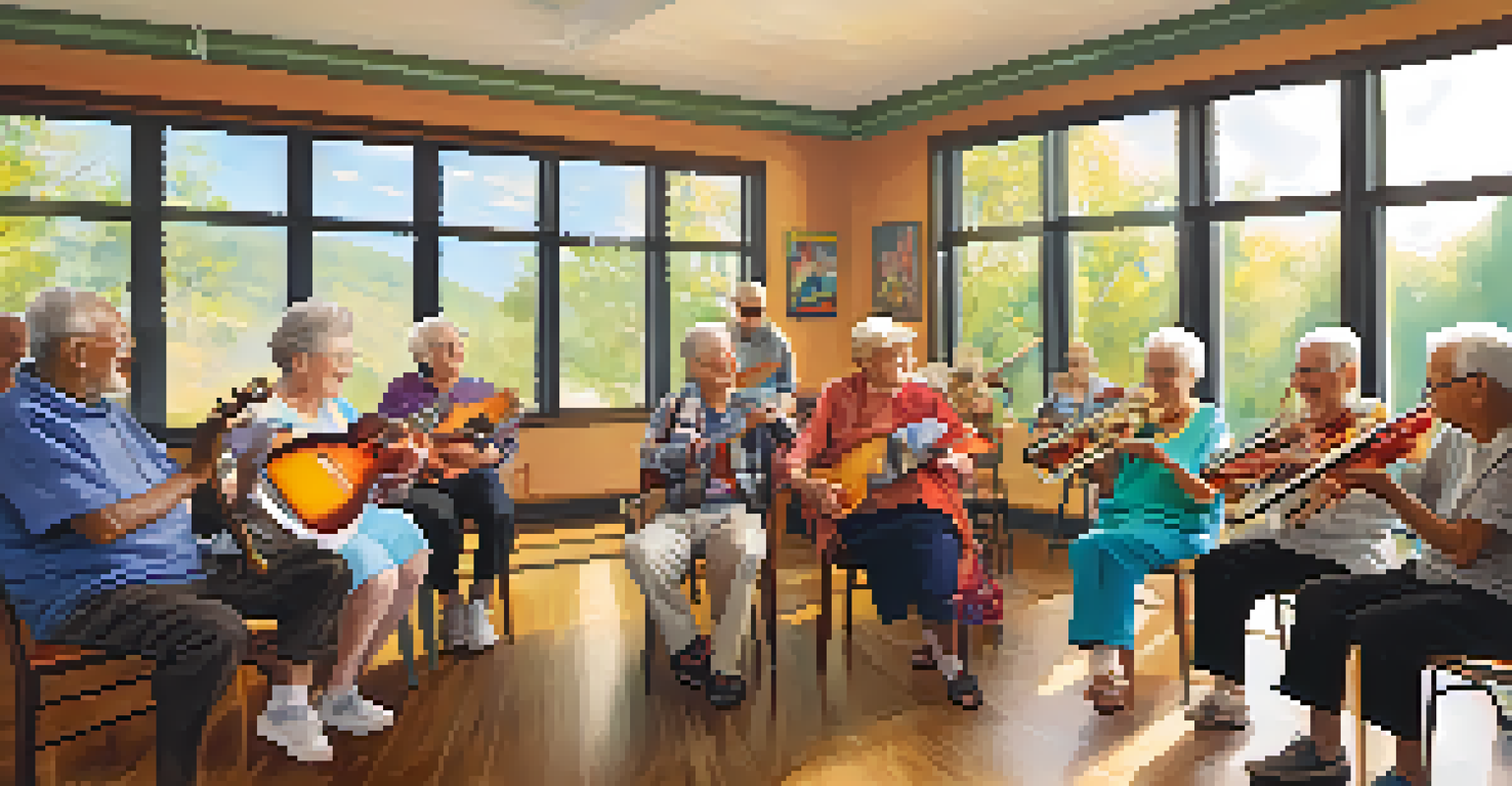The Connection Between Music and Emotional Healing in Seniors

Understanding Emotional Healing in Seniors
Emotional healing is a vital process for seniors as they navigate the complexities of aging. It encompasses the ability to cope with loss, loneliness, and changes in health. Understanding this journey helps caregivers and loved ones provide better support.
Music can change the world because it can change people.
For many seniors, emotional healing can feel daunting, but it’s essential for overall well-being. Music therapy can play a transformative role, offering a comforting outlet for expression. By tapping into the emotional power of music, seniors can find solace and connection.
Additionally, emotional healing can lead to improved mental health, reducing feelings of depression and anxiety. This is where music steps in, acting as a bridge to happier memories and feelings. Ultimately, the goal is to foster a sense of peace and fulfillment during this stage of life.
The Science Behind Music and Emotions
Numerous studies have shown that music has a profound impact on our emotions, and this is especially true for seniors. The brain processes music in ways that can evoke strong feelings, often linked to personal memories. This connection can trigger nostalgia, joy, or even comfort in times of sadness.

Music activates various brain regions, including those responsible for emotions, memory, and even movement. Through familiar tunes, seniors may experience a release of dopamine, the 'feel-good' neurotransmitter. This biological response can significantly lift their mood and enhance their emotional state.
Music Therapy Boosts Emotional Healing
Music therapy provides seniors with a creative outlet for emotional expression, which can significantly enhance their overall well-being.
Moreover, music can serve as a non-verbal form of communication, particularly for those with cognitive impairments. For seniors with dementia or Alzheimer’s, familiar songs can spark recognition and engagement, fostering emotional connections even when words fail.
Benefits of Music Therapy for Seniors
Music therapy is a structured approach that utilizes music to address emotional, cognitive, and social needs. For seniors, this therapy can reduce anxiety, improve mood, and enhance overall quality of life. It offers a safe space for self-expression and emotional exploration.
The music is a reflection of the soul. It is a way to express what we cannot put into words.
Through activities like singing, playing instruments, or even listening to music, seniors can reconnect with their emotions. This engagement can stimulate memories, provide comfort, and foster joy, leading to a more fulfilling experience. It's a holistic approach that nurtures the spirit.
Additionally, music therapy can promote social interaction among seniors. Group sessions encourage bonding over shared musical experiences, reducing feelings of isolation. This sense of community can be particularly beneficial in assisted living environments, creating a supportive atmosphere.
Creating a Personal Music Playlist
One of the simplest ways to harness the healing power of music is by creating a personal playlist for seniors. Including songs that resonate with their life experiences can evoke positive emotions and memories. A carefully curated playlist can be a daily source of joy and comfort.
Consider incorporating their favorite genres and artists, as well as tunes from significant life events. Whether it's a wedding song, a favorite childhood tune, or a classic from their youth, these selections can spark meaningful reflections. Personalization is key to maximizing emotional impact.
Personal Playlists Foster Connection
Creating personalized music playlists can evoke positive memories and emotions, strengthening connections with loved ones.
Furthermore, listening to music together with family or friends can amplify the healing experience. Sharing stories associated with specific songs fosters connections and creates a warm, nurturing environment. It’s a simple yet effective way to promote emotional well-being.
Music as a Tool for Mindfulness and Relaxation
Music can be an excellent tool for practicing mindfulness and relaxation techniques among seniors. Soft, calming melodies can help create a serene atmosphere, encouraging deep breathing and mental tranquility. This practice can alleviate stress and promote emotional healing.
Incorporating music into meditation or gentle exercises can enhance the overall experience. As seniors focus on the rhythm and melody, they can achieve a meditative state that fosters peace and clarity. This combination not only helps in emotional healing but also supports physical well-being.
Moreover, setting aside time for mindful listening allows seniors to be present in the moment. This practice encourages them to reflect on their feelings and thoughts, leading to a deeper understanding of their emotional state. Music becomes a guiding force in their journey toward healing.
Engaging with Music in Daily Life
Incorporating music into daily routines can significantly enhance the emotional well-being of seniors. Whether it's listening to the radio during breakfast or attending a local concert, these experiences can provide joy and connection. It’s about making music a part of their everyday life.
Encouraging seniors to participate in musical activities, such as singing in a choir or joining a drumming circle, can foster community ties. These activities not only boost mood but also provide opportunities for socializing and building friendships. It’s a win-win for emotional health.
Music Enhances Mindfulness Practices
Incorporating music into mindfulness and relaxation techniques can help seniors achieve emotional clarity and reduce stress.
Additionally, technology has made it easier for seniors to engage with music. Streaming platforms offer vast libraries of songs, while apps can remind them to take time for music each day. This accessibility ensures that music remains a constant companion in their lives.
Overcoming Emotional Barriers with Music
Seniors may face emotional barriers such as grief, loneliness, or depression, which can hinder their healing process. Music can serve as a gentle catalyst for overcoming these challenges. By providing an outlet for expression, it helps seniors confront and navigate their emotions.
For instance, a sad song might evoke tears, but those tears can be a sign of release and healing. Music allows seniors to process their feelings without judgment, creating a safe space for vulnerability. This emotional journey can lead to profound personal insights.

Moreover, sharing music with loved ones can help seniors articulate their feelings more openly. It opens up conversations about memories and emotions, fostering deeper connections. In this way, music becomes a bridge that connects the heart and mind, facilitating emotional healing.